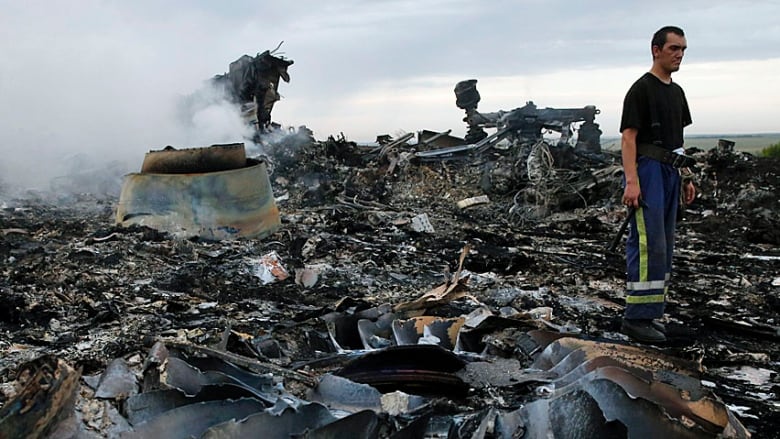Malaysia Airlines Flight MH17: Don't turn downing of jet into a Cold War club
This is no longer just about a quarrel in Ukraine

High above a conflict on the ground, which looked only to get worse, an airliner from a distant country on a routine flight is whacked out of the sky by — something.
In the uncertainty that follows, the 24/7 news operations give play to rumours, reports of intelligence service read-outs and, above all, competing accusations.
The president of Ukraine, where the doomed Malaysian passenger jet has been brought down, accuses the Russian separatists he is fighting of an "act of terror."
These rebels deny they even have the capability of carrying out such a deed, and in turn blame Ukraine's military for the downed aircraft.
People I know in the region are arguing it had to be the Russians. I haven't seen them yet, but the usual conspiracy blogs will no doubt be blaming this on the CIA any minute now.
Of course, someone is to blame, if we are to believe U.S. officials who say they have evidence the airliner was shot down by a surface-to-air missile.
Who in the area had a SAM capable of hitting a plane at 10,000 metres up?
Both Russian and Ukrainian armed forces are equipped with the Soviet-era BUK system that could do the job. But why would they?
As to the pro-Russia separatists in East Ukraine, one tweeted that his group had captured a BUK system. But could they have pulled it off, probably out of inadvertence?
Who knows? When will we know? Let's opt for patience on that.
Bring in a referee
The magnitude of this tragedy means the conflict on the ground is no longer just about a quarrel in Ukraine.
So the world community needs to insist on an impartial examination.

All we really know at this point is that the downing of Malaysian Flight MH17 has created a critical moment when this extended Russia-Ukraine crisis could go one of two ways.
Either this, surely unintended, disaster will bring people to their senses and will force the world community, including Russia, to get the fighters to stop and negotiate the issues that separate them.
Or the competing blame-game will ratchet up the venom and let loose the dogs of a wider war.
The most important priority is for everyone now to back off.
This is a disaster. But whatever harm those who launched the missile intended, the purpose was almost certainly not to bring down a Malaysia Air Boeing 777 passing peacefully high overhead. (Just as I had done several weeks earlier, on a flight from Kazakhstan to Vienna, speculating from high above on the unseen conflict wracking an otherwise verdant countryside on a cloudless spring day).
Also, we have seen variations of this movie before.
Back in 1983, a Korean jetliner strayed by a computer-input error a few hundred miles into Soviet airspace — only weeks after Soviet Air Defence had ignored a similar intrusion, which led to the firing of certain commanders.
This time, an interceptor was scrambled. The pilot was unable to identify the aircraft in the moonless dark.
Warnings went unheeded in the plane, which was on wayward autopilot. And Soviet ground control ordered the interceptor's pilot to shoot it down, convinced it had to be an American spy plane.
Crisis management
In the days after the KAL downing, some U.S. officials claimed that Washington had evidence from radio intercepts that the Soviet forces knew that what they were confronting was a civilian airliner.
In fact — fair warning to those who believe everything "high government sources" say — the transcripts of the intercepts indicated the opposite.
When then prime minister Pierre Trudeau learned (because Canada had access to these transcripts) that false accusations were being made out of ideological rivalry and geopolitics, he launched his end-of-career international "peace initiative," which Stephen Harper recently derided as an exercise in "moral equivalency."
It was no such thing. It was an exercise in developing transparent international rules of the road for crisis management in conditions of high risk.
And we need everyone in the international community to heed such rules of the road right now. Take deep breaths. Stop the trash-talk.
There are serious issues in Ukraine, but we've all had enough of the helter-skelter violence of recent weeks.
This latest escalation, however unintended, just reinforces that it is now way past time to get the parties to lay down the guns and come to the table without outside meddling of any kind.

